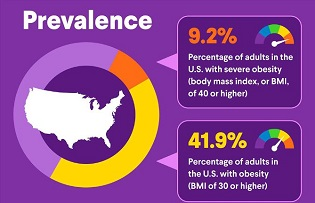Initial Assessment
Diagnosis and Staging
Diagnosis and Staging
Obesity is not about weight itself, but the health threats it causes due to the effects of excess weight or adipose tissue on your body. As a chronic disease, it can increase the likelihood of developing various complications and health issues, including cardiovascular disease, type 2 diabetes, and certain types of cancer. After your initial assessment, your health care professional will diagnose your stage of obesity to determine which treatment options are best for you.
Obesity Staging
Obesity staging is a metric that health care professionals use to describe the extent to which your weight affects your overall health. Determining your stage of obesity can help guide the discussions you and your health care professional have about your goals and treatment plan.
When you see your health care professional about your obesity, they will likely weigh you, calculate your body mass index (BMI), and measure your waist and/or neck size. But these numbers alone don't answer the question of whether — and how much — your weight may be impacting your health.
For example, one person with a BMI of 35 may have no weight-related health problems. Meanwhile, another person with the same BMI may have several severe weight-related medical conditions. Even though they share the same BMI, their overall health and obesity treatment plans may be very different.
Your weight, BMI, and waist circumference are all helpful data points. However, health care professionals also use a more precise metric to explain the impact of obesity on a person's health. This is known as "obesity staging."
Understanding the Three Stages of Obesity
To aid in the staging of obesity, your health care professional will classify your obesity as stage 1, 2, or 3 by screening and evaluating you for the presence and severity of different obesity-related complications. Screening for these complications is typically done through routine lab tests and health history. The severity of any complications (mild, moderate, or severe) is specific to each stage.
Previously, these three stages were known as stages 0, 1, and 2. However, that changed in 2023. Medical experts decided that using the numeral 0 for the first stage of obesity risked downplaying the seriousness of obesity, even when it isn't accompanied by weight-related medical conditions. They also wanted to avoid misunderstandings that might cause patients and health care professionals to delay treatment for obesity.
Here's what the three obesity stages are based on:
- Stage 1: Obesity with no obesity-related complications
- Stage 2: Obesity with one or more mild to moderate obesity-related complications
- Stage 3: Obesity with one or more severe obesity-related complications
In general, "mild" is used to describe complications that are detected by elevated lab tests but are not currently causing any major symptoms or impacting your routine activities.
Moderate complications may have higher lab values in addition to an increase in symptoms and may begin impacting your daily routine. Typically, you would be prescribed medication, such as a statin or blood pressure medication, and lifestyle changes to manage moderate complications.
A complication may be considered severe if it is not well managed with treatment and results in symptoms that routinely impact your quality of life.
Let's go back to the above example of two people who have a BMI of 35. The person with no obesity-related complications would be classified as stage 1. The person with several severe complications would be classified as stage 3. Each would probably have a different treatment plan recommended by their health care professional.
Please note: All three stages of obesity carry increased risks of developing obesity-related complications, including many types of cancer.
Obesity staging is a useful tool for you and your health care professional because it accounts for related complications — not just your weight or body size. Determining your stage of obesity can help guide the discussions you and your health care professional have about your goals and treatment plan.
Depending on your obesity stage, your treatment options may include:
- Setting realistic weight-management goals
- Healthy eating
- Physical activity
- Taking steps to reduce chronic disease risk
- Changing your behavior habits
- Taking weight-management medications
- Obesity surgery
Through shared decision-making, you and your health care professional will discuss treatment options based on your stage and personal goals.
Learn more about treatment options for each stage:
Complications of Obesity
Stages of Obesity and Weight-Related Complications:
You have obesity, but no obesity-related complications.
You have obesity and one or more mild to moderate obesity-related complications. Some examples include:
- Slightly elevated blood pressure
- Prediabetes
- Well-controlled type 2 diabetes
- Mild to moderate sleep apnea
- Borderline high cholesterol
- Mild to moderate asthma or reactive airway disease
- Mild to moderate osteoarthritis
You have obesity and one or more severe obesity-related complications that require significant weight loss for effective treatment. Some examples include:
- Poorly controlled diabetes
- Significantly elevated cholesterol
- Very high blood pressure
- Significant heart disease
- Severe sleep apnea
- Severe osteoarthritis
- Nonalcoholic fatty liver disease/nonalcoholic steatohepatitis
Having obesity increases your risk for many other chronic illnesses, such as:
- Type 2 diabetes mellitus: People with type 2 diabetes cannot make enough insulin and/or cannot effectively use the insulin in their bodies' cells. This leads to very high blood glucose levels. Obesity or being overweight can increase insulin resistance, which can lead to prediabetes and diabetes. Diabetes, in turn, is a risk factor for developing heart disease.
- Uncontrolled Diabetes: When diabetes is not well-managed with medication, diet, or lifestyle changes, it can lead to consistently high blood sugar levels, increasing your risk of serious health issues such as heart disease, nerve damage, kidney failure, and vision problems.
- Hypertension (high blood pressure): People with excess weight or obesity are more likely to develop high blood pressure. This, in turn, is one factor in developing heart disease.
- Uncontrolled Hypertension (High Blood Pressure): When high blood pressure is not kept under control with medication or lifestyle changes, it can increase your risk of heart attacks, strokes, and damage to your arteries and organs.
- Metabolic syndrome: Having obesity and an inactive lifestyle contributes to risk factors for metabolic syndrome, including high blood pressure and dyslipidemia (having abnormal levels of lipids in the blood).
- Coronary heart disease and stroke: Living with obesity or being overweight can lead to fatty material building up in your arteries and increase your risk of heart disease and stroke. Having high blood pressure, high cholesterol, or diabetes, which are all common with obesity, also makes you more likely to develop these conditions.
- Certain cancers: Obesity has been shown to increase the risk for 13 types of cancer. Among women, breast cancer after menopause is the most common cancer associated with obesity. Among men, it's colorectal cancer.
- Liver and biliary diseases: With obesity, fats build up in your liver and other tissue. This boosts your risk for various liver- and bile-duct-related diseases. Examples include cirrhosis, gallbladder disease, and nonalcoholic fatty liver disease (NAFLD).
- Breathing conditions: Obesity often leads to respiratory problems, including asthma, shortness of breath, obstructive sleep apnea (OSA), and chronic obstructive pulmonary disease.
Other possible complications of obesity include:
- Osteoarthritis
- Infertility
- Cataracts
- Gastroesophageal reflux disease
- Metabolic syndrome
- Polycystic ovary syndrome
- Urinary stress incontinence
- Depression and anxiety
- Eating disorders
Proven Treatment Options Are Available
If you have complications of obesity, such as diabetes or heart disease, it is important to adopt a comprehensive treatment plan to improve your overall health and well-being.
Adiposity-Based Chronic Disease (ABCD)
In 2017, AACE and the American College of Endocrinology introduced a new diagnostic term for obesity: adiposity-based chronic disease (ABCD).
This term:
- Identifies obesity as a chronic disease
- Places the focus on the health risks of having excess weight or adipose tissue (body fat)
- Avoids the stigma associated with the term "obesity"
Did You Know?
Cancer
- Forty percent of all cancers diagnosed in the United States each year are linked to obesity.
- Maintaining a healthy weight is one of the two best ways to protect yourself from getting cancer. (The other is quitting smoking.)





 DOWNLOAD
DOWNLOAD




